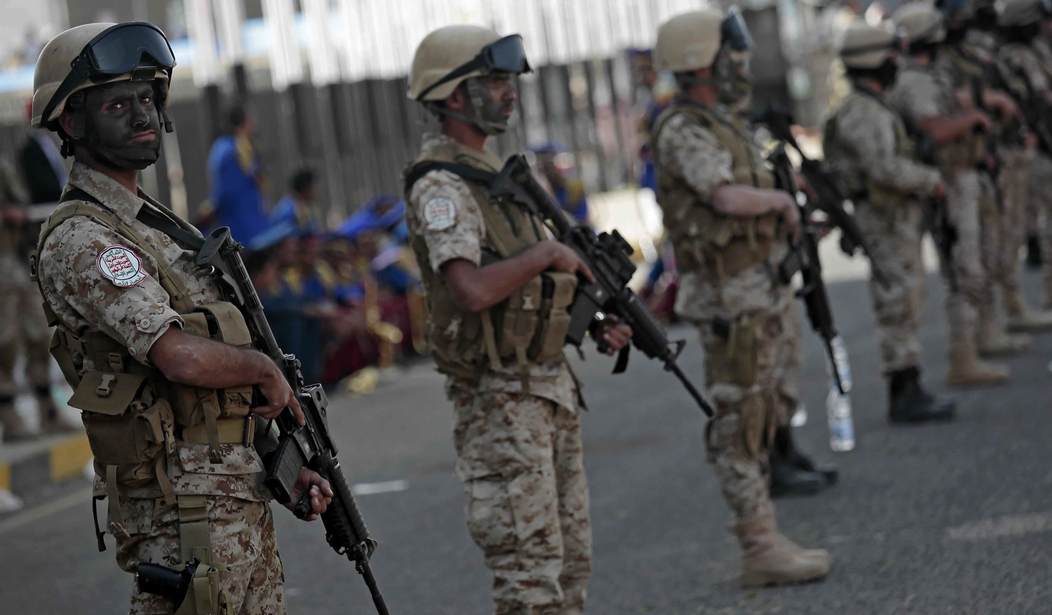On Monday, American and British forces carried out air and missile strikes against facilities in Yemen belonging to the Houthi rebels. The attacks are in response to attacks the Houthis have launched against international shipping in the Red Sea.
The U.S. and U.K. militaries, with support from Australia, Bahrain, Canada and the Netherlands, hit eight Houthi targets in Yemen in response to the Houthis’ continued attacks, according to a joint statement from the countries involved. The precision strikes were “intended to disrupt and degrade the capabilities that the Houthis use to threaten global trade and the lives of innocent mariners,” the statement said.
The joint strikes on Monday targeted a Houthi underground storage site and targets connected to the Houthis’ missile and air surveillance capabilities, according to the statement.
“Our aim remains to de-escalate tensions and restore stability in the Red Sea,” the statement said, “but let us reiterate our warning to Houthi leadership: we will not hesitate to defend lives and the free flow of commerce in one of the world’s most critical waterways in the face of continued threats.”
President Biden, when asked about the situation, produced (as usual) a rather baffling response.
President Joe Biden and his top aides have repeatedly said strikes on Houthi targets alone won’t stop the Iran-backed militants from threatening commercial ships in the Middle East.
When asked by a reporter last week if the airstrikes were working, Biden responded “Well, when you say ‘working,’ are they stopping the Houthis? No. Are they going to continue? Yes.”
See Related: Whoops: Biden Makes a Damning Admission About His Response to the Houthis
Were one to take that statement in the most charitable light possible, it still boils down to "The strikes aren't working, but we're going to keep doing them anyway."
Wait, what?
The Biden administration's efforts in this region have been disastrous, from the Charlie-Foxtrot abandonment of Afghanistan to the current engagement of the Houthis.
See Related: Disgusting: Kirby's Downplaying of Injuries to American Military in Iraq, As Attacks Continue
Biden's Iran Policy Has Now Killed Two U.S. Navy SEALs
Since the Second World War, the U.S. Navy has been the global insurance policy for maritime trade. Commercial shipping proceeded with confidence, knowing that the U.S. Navy kept the seas safe for passage, just as two thousand years earlier, merchants walked Roman roads knowing the legions were keeping order and protecting trade. But the U.S. Navy has deteriorated badly under the current administration, and it's not at all clear how much longer the Navy can keep this mission up.
The Red Sea is a vital shipping lane. A great deal of oil — energy — flows through the narrow waterway, bound for ports in China and Europe, among other places. Yemen, where the Houthis are based, occupies the eastern bank of the strait where the Red Sea flows into the Gulf of Aden. This narrow passage, called alternatively the Gate of Grief or the Gate of Tears but known in the region as Bab-el-Mandeb, is a nautical crossroads of note. At the narrowest, the Gate of Grief measures only 14 miles across; this is within range of most modern anti-ship missiles. The ballistic missiles Iran has supplied the Houthis with are badly obsolete but still dangerous to commercial shipping. This is a route that we can't afford to see closed.
It's unclear precisely what the Biden administration is trying to accomplish in the Red Sea. The president and his representatives seem to have very little idea as to how to proceed. Their replies to questions from the media are baffling and inconsistent.
As the president's former boss once famously pointed out, "Don't underestimate Joe's ability to f*** things up." For once, he was right.














Join the conversation as a VIP Member